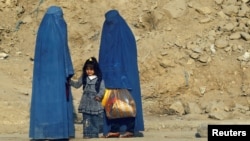A high-profile leader of Afghanistan’s ruling Taliban has pledged his country will never again be a terrorist threat to the United States and promised “very good news” soon on the return of Afghan women and girls to secondary schools.
Acting Interior Minister Sirajuddin Haqqani, also the deputy Taliban chief, renewed the assurances in a rare interview with CNN’s Christiane Amanpour broadcast on Monday.
The Taliban regained power after U.S. and NATO troops withdrew from the war-torn South Asian nation last August and established an all-male interim government, calling it the Islamic Emirate of Afghanistan.
The hardline group has allowed female university students to return to classes in a newly introduced, strictly gender-segregated education system. But despite repeated pledges to let teenage Afghan girls return to their classes, the Taliban have not yet reopened high schools to girls.
“There is no one here who opposes education for women, and girls up to grade 6 are already allowed to go to school,” argued Haqqani, long one of the most secretive Taliban leaders and who showed his face in public for the first time in March.
He said that “the work is continuing on a mechanism” to allow girls above grade 6 back to school. ”Very soon you will hear very good news about this issue,” the minister added. Haqqani indicated reopening of girls’ schools depends on dress codes.
“We must establish the conditions so that we can ensure their honor and security. We are acting to ensure this,” he said, adding that education should be based on Afghan “culture” and “Islamic rules and principles.”
Since returning to power nine months ago, the Taliban have decreed that women must wear a full veil in public and preferably a burqa, which had been mandatory when the radical group first ruled Afghanistan between 1996 and 2001.
The veil restriction, announced a week ago, has outraged domestic critics and the international community.
The Taliban have already banned women from undertaking long road trips without a close male relative and barred males and females from visiting parks at same time, among other curbs on women’s rights. Most female government employees have not been allowed to return to work.
“We are not forcing women to wear hijab, but we are advising them and preaching to them,” claimed Haqqani. “Hijab is not compulsory, but it is an Islamic order that everyone should implement.”
The international community has not yet recognized the Taliban government and warned escalating restrictions on women’s rights could further alienate donor countries and organizations.
The Islamist rulers are also being pressed to govern the country through a broad-based political setup where all Afghan groups have their representation. The Taliban have dismissed as misplaced the criticism that their government is far from inclusive.
Ties with US
Haqqani defended the Taliban insurgency, saying it was a defensive action against occupation of Afghanistan, he told CNN. But, he said, the Taliban would like to have good relations with the U.S. in the future and the international community at large.
“Currently we do not look at them as enemies, and we have time and again spoken about diplomacy,” he said when asked whether his group still considers America its enemy.
The minister insisted that the Taliban intend to respect the landmark troop withdrawal agreement signed with Washington in 2020, which binds the group not to allow Afghanistan to become a haven again for international terrorists.
Haqqani was heading a group of militants, known as the Haqqani network, and aligned it with the Taliban to wage insurgent attacks against the now defunct Western-backed Afghan government and U.S.-led foreign troops in the past 20 years.
Haqqani is still on the FBI’s most wanted list for plotting deadly attacks against American and allied troops in Afghanistan. The U.S. has a $10 million reward for his arrest.






